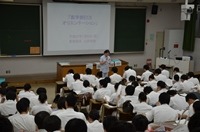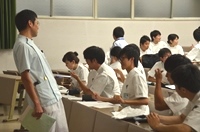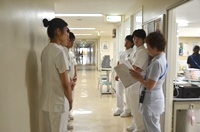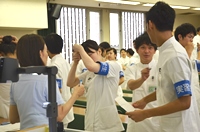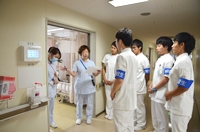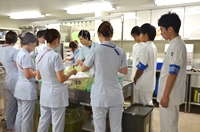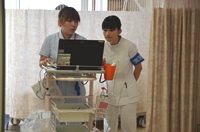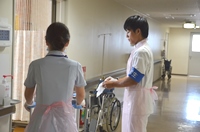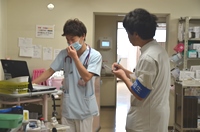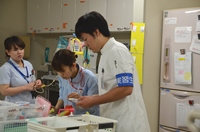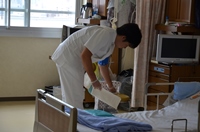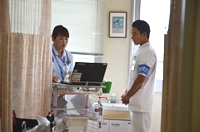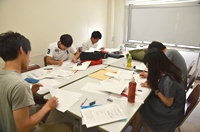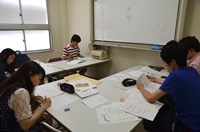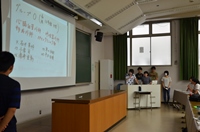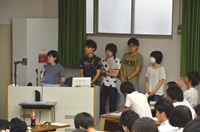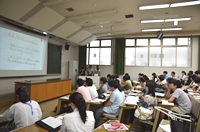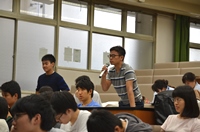Undergraduate and Graduate School
Early clinical experience (first year)
Early Clinical Exposure is a type of clinical training that allows newly admitted School of Medicine students to experience actual medical practice, helping them develop a sense of self-worth as medical students and motivating them to become doctors.
Since this training is conducted just after enrollment and when students have little or no medical knowledge, it is not aimed at the acquisition of specialized knowledge or techniques. Rather, the main goal is for students to understand the suffering of the so-called socially vulnerable as individuals through nursing and care for patients, and from that, become aware of what they should do as future doctors.
Day 1: Orientation
During the orientation, the head of the nursing department will explain the outline of Hyogo Medical University Hospital and the duties of the nurses they will be trained in during their training. After that, a professor of Department of Medical Informatics will give a lecture on the handling of personal information, where students will learn the importance of information security.
Next, the students discuss their appearance and decide on appropriate clothing and hairstyles for the hospital training. After the appearance check, each group goes to the ward where they will be training to say hello.
Days 2 and 3: Ward training
After a grooming check, participants will head to the ward in groups of 5-6 people and experience nursing work with nurses. They will learn about the flow of a nurse's work by observing (with some assistance) the tasks carried out in the ward, such as taking temperatures, administering medication, admitting hospitalized patients, caring for discharged patients, admission and discharge procedures, wiping and changing linens, assisting with meals, maintaining the environment, and keeping nursing records.
You will also learn about patients' life in hospital, the feelings of those who become ill, and the collaboration between nurses and other medical professionals.
Day 4: Group presentations
Participants will be divided into groups and will summarize what they felt and learned, and each group will present their results.
They will also listen to the other groups' training content and impressions, ask questions and give their opinions, and share the results of their training.
Student comments at the presentation
- It gave me the opportunity to think about what I would want if I were in the patient's position.
- I learned the importance of working as a team, rather than just the doctor providing treatment.
- I was able to see things from a perspective that I would not have been able to see if I had become a doctor.
- I was able to gain a deeper understanding of the work of nurses and realized that collaboration with nurses will be important even when I become a doctor.
- I felt that communication was the most important thing in my work, both with patients and medical professionals.
- Seeing how everyone handled the situation so wonderfully made me want to surpass them and become a doctor that people can rely on when I work with them in the future.
- By experiencing the medical field, I was able to get a clearer image of myself working as a doctor.
- I also realized the importance of record-keeping and information management, not just in procedures and treatment, but also because even a single mistake in a number when keeping records can lead to a medical error.
Student impressions
- [Isaji Luwei]
- By experiencing the actual medical field, I was able to get a sense of what it would be like to become a doctor, which has increased my motivation for my future studies. I realized the importance of communication, so I want to become a doctor who can build good relationships with nurses and patients.
- [Natsuko Yamamoto]
- Since I was on my feet all day, I realized that I needed physical strength. I wanted to gain knowledge and physical strength by experiencing the actual medical field. Also, I had only experienced being a patient until now, but through my training I was able to experience being a medical professional, which broadened my horizons. There are many different types of patients, so I wanted to become a well-rounded doctor who can properly respond to each individual patient.
- [Mr. Togashi Suke]
- I felt that experiencing the work of a nurse and the position of a medical professional through this training was a good experience in terms of team medical care. I learned that some of the work I thought doctors would do was actually done by nurses, and I also learned about the division of labor in the field. Although I am not in a position to do anything yet, I want to get involved in treatment soon, and my motivation has increased.
